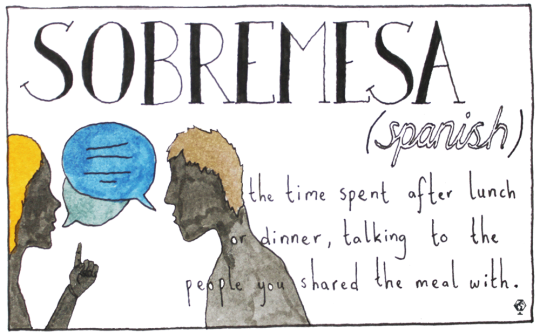Never take for granted your ability to understand your parents.
My parents sit around our table sobremesa discussing important issues. I can understand primitive phrases but I can’t get a clear idea of how my parents make their decisions, which I presume to be talked through and deeply analyzed.
Some people don’t face language barriers within their own families, but instead they hole up in their rooms or leave the house after dinner, leaving their own twenty-first century experiences to designate and dictate their beliefs.
The thing is…while your parents may have been born in another century and perhaps even another country, their experiences are still wholly relevant; lots of the lessons they’ve learned are universal and timeless.
There are two ways to learn from your parents.
The direct method fails for me, because it’s essentially the only way I’ve learned anything from my parents. It devolves to a lecture, devoid of detail and largely redundant.
As a first-generation Asian American, I crave the indirect, but I can only learn in English. My parents, however, cannot meaningfully convey their ideas as well in English as they can in Chinese. Their first dialect is most descriptive and transcends the bare necessities of just communicating general ideas.
I can never listen in on my parents’ late night conversations when they choose special Chinese phrases or metaphors to convey their sentiment.
It’s not something that you realize suddenly, but gradually, as you find that tuning into their evening discussions is a fundamental experience that lots of kids these days take for granted.
Even my fictional heroine can eavesdrop on the conversations between the adults in her life.
Francie Nolan from A Tree Grows in Brooklyn frequently bends an ear towards the chats between her mother Katie and her father Johnny, Katie and her Aunt Sissy, and more. Her snooping allows her to how to acquire most of her insights and realizations about the larger world around her.
It’s hard to communicate with my grandparents and relatives too; language is essential, especially if lots of them live on the other side of the world. Gifts and other gestures don’t cut it.
When I was a toddler, I was nearly fluent in Chinese. After being enrolled in American preschool, however, I managed to lose it all.
To artificially restore my bilingual abilities, I was enrolled in a Chinese class on the weekends and painfully force-fed the language like a chicken.
My speaking skills were solidified through travel but waned over time, lost in the dominance of the American culture, to the extent that when I speak my native language, I have an unfortunate American accent.
English has become my main language after four years of intense SAT vocabulary, a year of blogging, an eloquent high school policy debate career, and a lifetime of immersing myself in the words and culture.
Seldom at a loss for words, I’d consider myself well-versed in the English language.
In regards to Spanish, on the other hand, I am nearly incompetent. I have no clue how I passed the AP Exam last year; vocabulary comes easily through rote memorization but verb tenses slay me.
If business deals were my game, I’d be content. I can get basic ideas across lingual divides, but I’m ultimately not satisfied with my “mastery” of the Chinese language.
So if you can, don’t take your ability to communicate for granted. Instead of holing up, sit on the stairs and learn something new.
– WWC

Hi, Great post. Language barriers are a common challenge in international business settings—and a two-way process. What native speakers often don’t realize is that frequently it is not the other person’s accent but their own way of speaking that creates the greatest barriers to effective communication.
Thanks for this post.
LikeLike
Thank you! I’m glad that the dialect, vocabulary, metaphors etc. actually do matter and indicate that someone perhaps, isn’t speaking their native language. :)
LikeLike
I can speak many languages but unfortunately it is only computers that can understand what I am saying :) I think a language is like one part of a painting. The more languages you can speak the more of the picture(Life) you will see. I would like to know lots of languages but unfortunately I seem to struggle with just one.
LikeLike
Love that analogy, it makes so much sense! Haha, I’m sure we all connect through language.
LikeLike
I come from a multi-language home myself, and though someone almost always translated for me– it’s not quite the same as the quick back and forth of quiet chitchat. I loved your story, but I love-loved your point. All of those moments are precious. Thanks for the reminder, and thanks for participating in the challenge this week! :D
LikeLike
Rarasaur! Thanks for reading, and I’m glad you enjoyed it! Took me a while to turn my sentiment into words
LikeLike
I loved this. You make such a great point. We love in a generation where children are always on the move or completely focused on other things to have actual meaningful conversation with their parents and definitely take this pleasure for granted. Me and my mother have always had talks after dinner. In that time you can learn so much and build a much more positive rapport. I just started blogging so if you ever have any tips for a newbie that would be appreciated!
LikeLike
Hey! Thanks for reading, I’m glad you enjoyed this. I hope that you continue to have meaningful talks with your parents, never take them for granted. If you need any specific tips, please ask! I’ll check out your blog and comment there.
LikeLike